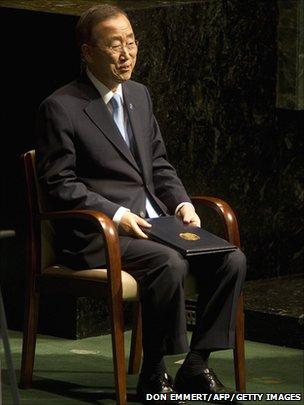Profile: Ban Ki-moon
- Published

Quiet diplomacy and bridge-building are strategies that served Ban Ki-moon well in his pursuit of a second term at UN Secretary-General
Ban Ki-moon is the eighth secretary-general of the United Nations.
He was re-elected for a second term by the UN General Assembly, unopposed and unanimously, on 21 June 2011, with effect from 1 January 2012.
Mr Ban describes his priorities as mobilising world leaders to deal with climate change, economic upheaval, pandemics and increasing pressures involving food, energy and water.
In style, he prefers quiet diplomacy and sees himself as a bridge-builder, aiming to give voice to the world's poorest and most vulnerable people, and to strengthen the UN itself, which was dented when he took office by scandals over the UN oil-for-food programme in Iraq, and corrupt procurement.
North Korea talks
The South Korean diplomat took over from Kofi Annan at the UN in 2007.
At that time he promised to push for peace in the Middle East and Sudan's Darfur region, and he prioritised climate change.
The consensus on his first term was largely positive, despite the elusiveness of many of his goals.
He wants to be remembered as the UN leader who presided over a global agreement on climate change.
Born on 13 June 1944 in Chungju, Mr Ban served as South Korea's minister of foreign affairs and trade immediately before moving to the UN, at the culmination of a 37-year career as a diplomat.
That career included the tough, high-wire act of negotiations with North Korea over its development of nuclear weapons.
He is married with three children and three grandchildren.
In the past, UN leaders have normally served two terms, although Egypt's Boutros Boutros-Ghali was ousted after just one term in 1996 by the United States, which felt he had performed poorly over the Balkan wars.
Mr Ban is the second Asian to lead the UN. He has enjoyed broad support, but he has his critics, who point to his low-key style, lack of charisma, and failure to criticise human rights abuses in powerful countries, like China and Russia.
At the end of his first term, however, he won praise for his commitment to climate change, nuclear disarmament and women's issues, as well as his strong backing of pro-democracy movements in North Africa and the Middle East.
Mr Ban says he first dreamed of becoming a diplomat when as an 18-year-old student in 1962, he met US President John F Kennedy at the White House on an American Red Cross programme.
When he was first vying for the top job at the UN, he said of himself: "I may look soft from the outside, but I have inner strength when it's really necessary."
- Published21 June 2011
- Published17 June 2011
- Published2 May 2011